
views
- Degree requirement: Bachelor's degree
- Job outlook: Mechanical engineering is growing by ~2% per year
- Median salary: $93,000 USD
Meeting the College Degree Requirements

Look into colleges that offer accredited bachelor's degrees in mechanical engineering. When you start evaluating schools that offer mechanical engineering, focus on those with the proper accreditation based on their location. For instance, programs in the U.S. should be accredited by the American Bureau for Engineering and Technology (ABET). In many U.S. states, you won’t be able to become a licensed mechanical engineer without an ABET-accredited bachelor’s (or higher) degree in mechanical engineering.

Choose either a more theory-based or more hands-on program. Some mechanical engineering programs prioritize larger analytical and theoretical knowledge, which can prepare you for a wide range of careers within the field. Other programs focus more on experiential and hands-on opportunities, which may help you better prepare for a specific area of mechanical engineering. If you already know the specific area of mechanical engineering that you want to work in—aeronautics, for instance—a more targeted and hands-on learning experience may suit you better. No degree program is purely theoretical or experiential, though. Ask questions about program content with your contacts at each college you’re considering.

Take your core coursework very seriously. There’s no way around it: the math, science, and engineering coursework you need to complete to earn this degree is very challenging. You need to stay dedicated and focused. That said, building connections with your professors and fellow students can help immensely, so don’t simply isolate yourself in your study nook. Don’t give up! At some point you may fail a class and question your decision. Just remind yourself that all good things take time and effort.

Develop solid writing and communication skills. Taking classes in communication and writing may seem like a distraction from your main focus, but they build valuable skills for this field. Documentation and technical writing skills are a must in most mechanical engineering jobs. Also, being able to communicate effectively with non-specialists is an important aspect of mechanical engineering.

Do internships to gain experience and build your network. Even colleges that aren’t focused on hands-on training will offer or support opportunities for internships related to mechanical engineering. Treat these opportunities as an important complement to your coursework. Not only will you gain on-the-job experience, you’ll also have the opportunity to make connections with employers and others in the field. Building your professional network while you’re still in school will help you when it comes time to look for a job.

Graduate with your bachelor’s degree in mechanical engineering. You can typically complete this degree in 4 years, though it’s not unusual for it to take up to 5 years for many students. Once you have your degree, you’ll be ready to begin the professional licensing process and look for jobs. Some schools also offer 5-6 year dual programs that allow you to earn both a bachelor’s and master’s degree in mechanical engineering. There’s a decent chance that you’ll need to earn a master’s degree at some point in order to advance your career, so think about whether it is worth working toward now or later.
Finding Work and Getting Licensed

Pass the Fundamentals of Engineering (FE) exam after graduation. In the U.S., you are eligible to take this initial licensing exam as soon as you earn your degree. The version of the FE tailored for mechanical engineering is a 6-hour, computer-based exam with 110 questions. You can find information on test times and costs, testing procedures, and prep materials at https://ncees.org/engineering/fe/. This is your first step toward full licensure as a mechanical engineer. Testing and licensure requirements will be different in other countries.

Lean on your professional network when seeking your first job. Although the mechanical engineering field is growing, your dream job probably won’t fall into your lap right after graduation. It also probably won’t do to just search through general and field-specific job sites. Instead, tap into the network of friends, colleagues, mentors, internship coordinators, and so on that you nurtured in college. While seeking a full-time job, take on part-time work, or additional internships or even volunteer opportunities that come your way. This shows that you’re energetic and eager to contribute. Co-op programs or internships can provide excellent experience while you’re seeking your first full-time job. The U.S. federal government offers co-op programs along with junior engineer hiring programs. Check the Office of Personnel Management (OPM) website for more information.

Tailor your resume and cover letter when you apply for jobs. Keep your resume up-to-date with new skills and work experiences, and revise it to suit each job that you apply for. Likewise, your cover letter should be individually-crafted for each application. You want both documents to show why you are a great fit for that specific job. Instead of listing everything you’ve ever done, keep your resume focused on experiences that are relevant to the field and the job at hand. However, briefly mentioning skills and outside interests that emphasize your positive traits (leadership, team-building, perseverance, etc.) can also help. If you can provide metrics of your problem solving skills, this can be helpful for setting you apart from other candidates, such as showing in percentages or numerical averages how you have previously reduced risk, saved a company money or time, or increased safety. Your cover letter needs to immediately explain why you are the ideal candidate for the job, then support this contention with evidence.

Ace your interview by putting your “soft skills” on display. While your resume and cover letter will provide your core qualifications for the job, use the interview to show off your desirable personality traits. Engineers need to be good communicators, team players, positive-thinking, and great at handling pressure, among other qualities. Prepare thoroughly for every interview to make sure you emphasize such qualities. Do mock interviews with advisors, mentors, or colleagues in the field. Get used to answering common questions succinctly yet completely. Investigate the company thoroughly before the interview. Practice speaking and presenting yourself in a confident manner.
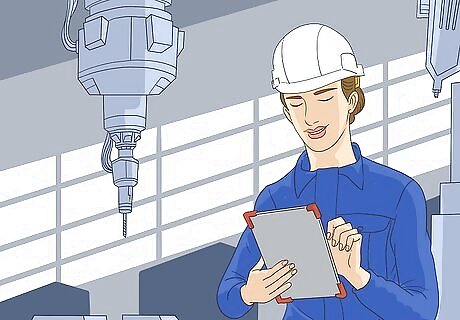
Gain 4 years of relevant work experience. In addition to passing the FE exam, you need to have this period of work experience in order to take the second licensing exam. Jobs related to mechanical engineering will of course count, and some internships, fellowships, or research programs may also count toward the 4 year requirement. In the U.S., the specific requirements vary by state. The 4 year requirement is found in many U.S. states, though.

Pass the Professional Engineer (PE) exam to get licensed. In the U.S., the PE exam tailored to mechanical engineering is an 8-hour, 80-question, computer-based test offered throughout the year. Registration details and testing costs vary by U.S. state, but you can find general information on the test and preparing for it at https://ncees.org/engineering/pe/mechanical/. Combined with your passing FE score and your 4 years of experience, passing this exam will permit you to obtain professional licensure in your U.S. state. Some U.S. states allow you to take the PE Exam before satisfying the experience requirements. Note that you will not be entitled to call yourself a Professional Engineer unless you complete all the required experience as determined by the state. Engineering licenses are typically transferable from state to state in the U.S., without having to take additional exams.
Advancing Your Career

Join professional organizations to build your network. Going to conferences, attending meetings, and generally making connections with other mechanical engineers can be of great benefit to your career. Building your professional network can open up new job opportunities within your current area of the field, or provide a path to moving into new areas of mechanical engineering. In the U.S., for instance, you might join the American Society of Mechanical Engineers (ASME).

Complete continuing education (CE) coursework to maintain your license. In most U.S. states, you’ll need to renew your PE license annually. As part of this renewal, you’ll often need to document a minimum amount of CE coursework. CE credits demonstrate that you’re keeping up-to-date with new developments in the field. CE can be earned through in-person seminars, online tutorials, and many other forms. Check with the licensing bureau in your state or your professional organization for details.

Work toward a doctoral degree if it suits your career goals. A doctorate is not required for most jobs within the mechanical engineering field. However, if you want to become a university faculty member, move into a management position, or advance in research and development work, you may need to earn a doctorate. In some cases, it may make sense to work straight through from a bachelor’s, to a master’s, to a doctoral degree. Or, it may be more sensible to advance in the field for several years before starting work toward a doctorate. As before, look for accredited programs that suit your professional goals.
Starting on Your Path in High School

Study math, science, and computer science in high school. Study pre-calculus and, if possible, calculus at a high school level, and be sure to take chemistry and physics classes. Physics and calculus combine to form the backbone of engineering courses, so understanding them is key to getting a degree. Mechanical engineering increasingly requires a strong knowledge of computer programming, so start learning it early.

Participate in math contests and science fairs. Any time your school offers a competition or showcase that requires you to solve problems or build something, sign up for it. Seize every chance you can to exercise your creativity and develop your problem-solving skills. Mechanical engineering is all about making things and coming up with solutions. Try engineering contests, too, if they are active in your area. See if there are engineering summer camps in your area.
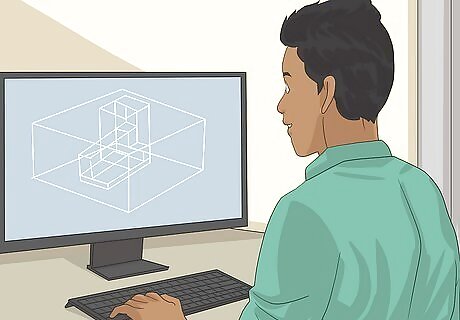
Take drafting classes in high school, if available. Many high schools offer drafting and design classes. If yours doesn't, see if you can take such courses at a local community college instead of waiting until you're at your college of choice for mechanical engineering. If at all possible, take at least one CAD (computer-aided drafting) class. Working with computers is now essential in all areas of mechanical engineering, and CAD can be useful in many areas of the field.
Nurturing Your Interest in Mechanical Engineering
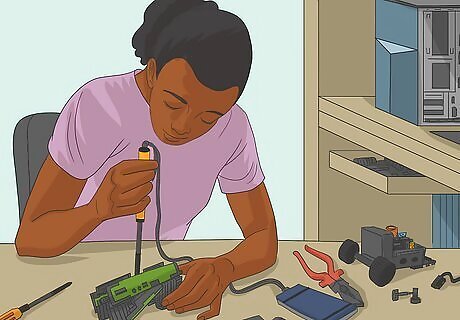
Develop hobbies related to mechanical engineering. These may include astronomy, rocketry, geology, auto mechanics, bicycle repair, welding, or even robotics. Any sort of tinkering is good practice. Plenty of today’s mechanical engineers started off by tinkering with Lego bricks as kids, and kept on adding new creative and problem-solving hobbies.
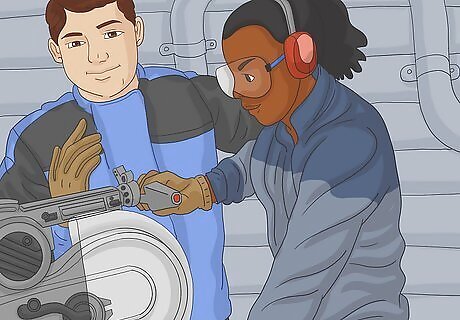
Gain experience using hand and power tools. Hammers and screwdrivers are a great place to start, but there are many more types than that. If you have the opportunity to take a wood, metal, or plastic shop class, do so. Auto shop is also a good choice. Don't forget to learn about various kinds of measuring tools, too.
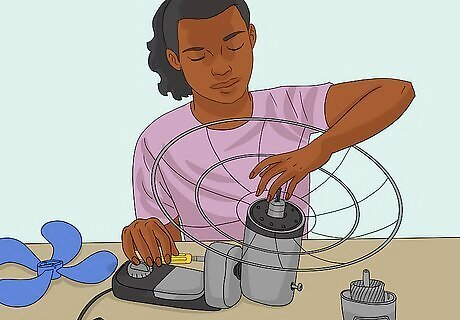
Take old machines apart to learn how they work. Ask friends and family to give you appliances and other machines that have broken, or gather them inexpensively from garage sales or even neighbors' curbs. Then, open them up and see what makes them go. If you can put something back together so that it works, great! If not, figure out what's inside and see what you can learn from it before throwing it out. If you're still not sure how something works after taking it apart, look it up and find out. Use tools appropriately, unplug things before opening them up, and don't mess around inside televisions and CRT monitors. (The capacitors inside can hold a dangerous charge long after they are unplugged.)
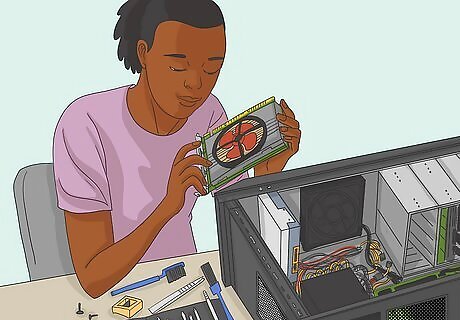
Work on electronic devices and explore the field of electronics. Although electronics are more closely associated with electrical engineering, mechanical engineers need, at the very least, to be able to communicate with electrical engineers. More and more systems are electromechanical, so it's good to know a bit of both. Some mechanical engineers do specialize in electrical engineering and become electro-mechanical engineers. Try things like ham radio operation and computer repair. Build stereo speakers or learn the resistor codes for fun.

Solve problems by inventing or reinventing things. Your invention doesn't have to be the next light bulb or even a new idea. It could be something as simple as a bent wire coat hanger to dislodge something that always sticks. It could even be a new process or a more efficient way of organizing your desk or going about your day-to-day tasks. Create invention challenges for yourself. For instance, see how far you can make a mousetrap- or gravity- powered vehicle go.
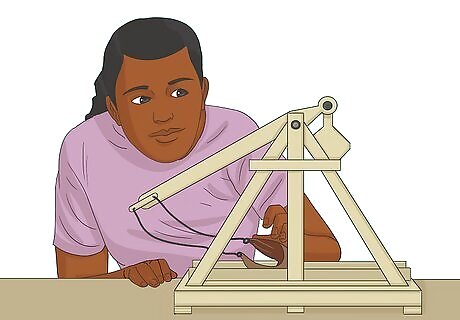
Build furniture and machines with instructions or on your own. Assemble boxed furniture or start from scratch. Make a potato launcher. Create your own lava lamp or trebuchet. Even fun or silly projects will help you get used to thinking about how things work, and how they are built.

Take an interest in manufacturing. Think about, and then find out how, the things you buy and use are produced. Where do paper clips come from? How about computer chips or jelly beans? Part of a mechanical engineer's job is to design things so that they can be efficiently, inexpensively fabricated. Go on factory tours in your area, and ask questions during and after the tours. You might even consider getting a summer job in a factory.

Develop your creative side along with your analytical side. Although much of mechanical engineering involves being systematic and analytical, it is also about creative problem solving. Try drawing, writing, juggling or doing magic, playing music, and exploring new ideas and places. Nurturing your creativity won’t just make you a better engineer; you’ll also be a more well-rounded person in general.




















Comments
0 comment